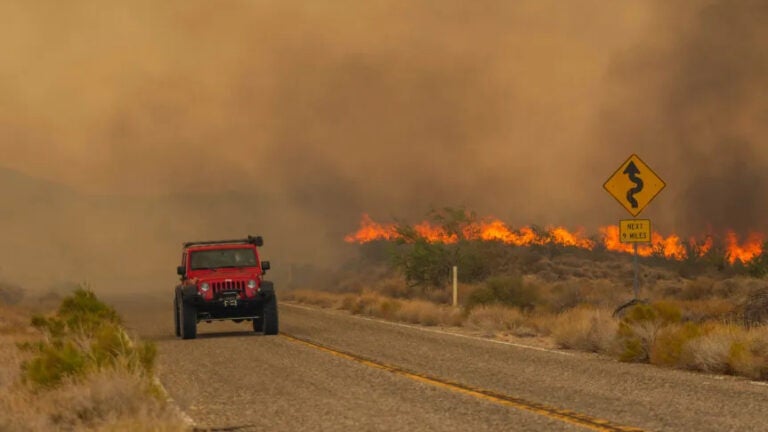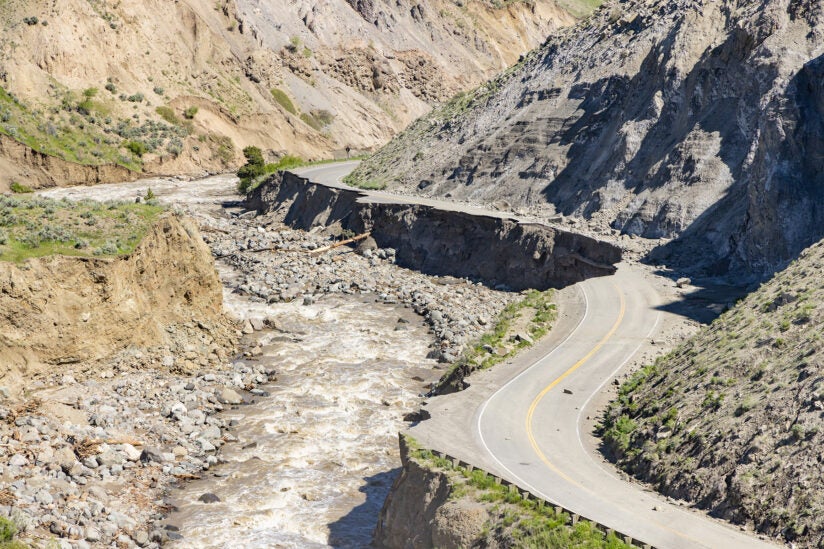
A car passes rising flames from the York Fire on Ivanpah Rd., Sunday, July 30, 2023, in the Mojave National Preserve, Calif. Crews battled “fire whirls” in California’s Mojave National Preserve this weekend as a massive wildfire crossed into Nevada amid dangerously high temperatures and raging winds. (AP Photo/Ty O’Neil)
Eco-grief is real — here’s what you can do about it
GREEN WEEK: USC experts discuss the profound effects of the climate crisis on human health and well-being.
The visuals accompanying climate change are hard to ignore: communities engulfed in flames, neighborhoods submerged by floods, habitats like coral reefs — once teeming with life and vibrance — now bleached, brittle and barren.
Experts warn of a parallel crisis, hidden from sight but no less important. Climate change is wreaking havoc on our collective mental health and well-being.
“Climate anxiety,” “eco-grief” and even “solastalgia” are terms being used to describe the overwhelming feelings of fear, despair and despondency that come with bearing witness to the natural world’s suffering. The constant stream of distressing news, coupled with the uncertainty of the future, can lead to heightened stress and a deep sense of loss, according to experts.
USC experts, guided by the university’s Assignment: Earth goals and informed by cutting-edge research in sustainability and environmental justice, are actively working to support individuals and communities in navigating all aspects of the climate crisis.
“Severe weather events are upending people’s lives and well-being — they are taking loved ones, decimating people’s homes and livelihoods, and leaving our neighborhoods unrecognizable in their wake — each of which has real and lasting health consequences,” said Emily Smith-Greenaway, an associate professor of sociology and spatial sciences at the USC Dornsife College of Letters, Arts and Sciences.

“But perhaps what is even more concerning is that after the initial disaster abates — and the news crews pack up to move on to cover the next weather event — we know that the health impacts of these events can linger and even accumulate with time,” she said. “This makes it difficult for both ordinary people to fully appreciate, and scientists to track empirically, the true toll that climate change is having on our population’s health and well-being.”
Eco-grief makes it harder for communities to prepare for natural disasters
Experts underscore the importance of recognizing and alleviating the emotional strain of climate change on communities. Santina Contreras, an expert in community-engaged environmental planning and an associate professor at the USC Price School of Public Policy, explained that communities around the world are angry and exhausted from having to prepare for multiple disasters at the same time, like the “hurriquake” that recently hit Southern California.
It can be so overwhelming that people disengage entirely, making it even harder to prepare for future disasters, she said.
“That’s why we need to work directly with communities to understand their needs before and after disasters,” Contreras said. “We have amazing science to help find solutions, but if it is disconnected from the people that are experiencing these issues firsthand, then there is still so much we don’t know unless we talk to them.”
How to cope, heal and turn eco-grief into climate action
To counter eco-grief, experts recommend tapping into the therapeutic benefits of engaging with nature.
“There is a growing movement to help people process their eco-grief and climate anxiety through cultivating a deeper personal relationship with nature and tending to nearby nature at the hyper-local level,” said Camille Dieterle, an expert in health and wellness who has led workshops on coping with eco-grief.
Dieterle recommends gardening at home or in a community garden, as well as learning about and getting involved in local initiatives to restore land and habitats to help cope with eco-grief.
Interacting with nature is calming in and of itself.
Camille Dieterle, USC Chan Division
“Interacting with nature is calming in and of itself, and there is the added layer of feeling a sense of contribution to current problems,” said Dieterle, an associate professor of clinical occupational therapy at the USC Mrs. T.H. Chan Division of Occupational Science and Occupational Therapy.
Civic engagement is also a powerful tool to redirect climate anxiety into meaningful experiences that offer a sense of hope, according to experts. Online spaces can be especially helpful in connecting like-minded individuals and organizing collective actions.
“To feel less helpless, people may want to participate in climate politics, such as leaving comments in local or federal registers, calling elected officials about climate policies, and/or to showing up to virtual (or in-person) town halls where people address leaders,” said Christina Dunbar-Hester, an expert in tech-powered activism and professor at the USC Annenberg School for Communication and Journalism.
“Logging off is always an option if one would feel better disconnecting for a while. The urgency of these issues and campaigns will still be there when you log back on,” she said.
USC provides a variety of resources for students, employees and parents to prepare for emergencies, take safety precautions, and find help and personal services. More information about support resources at USC is available online.


